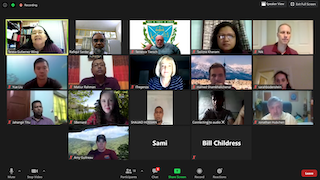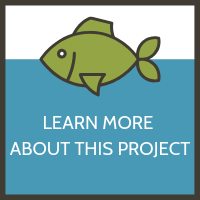
Laura Zseleczky
Restrictions during the COVID-19 pandemic have altered the plans for many research activities in 2020. As part of the Feed the Future Innovation Lab for Fish (Fish Innovation Lab), scientists from Bangladesh Agricultural University had planned to visit their colleagues at the Louisiana State University Agricultural Center to learn about cryopreservation—the science of preserving cells and tissues at very cool temperatures—to improve the genetic quality of carps for aquaculture in Bangladesh. When travel restrictions prevented the in-person training from happening, the researchers pivoted to create a series of six interactive virtual workshops beginning on September 30, 2020, to provide the training and facilitate cooperation between the U.S. and Bangladeshi teams.
“As the Louisiana State University Agricultural Center has a sophisticated setup for cryopreservation and repository work and Prof. Dr T. Tiersch and his colleagues have vast experience on such kinds of research, we hope the collaboration with LSUAC will help us to achieve our project targets,” said Md. Rafiqul Islam Sarder, a professor at Bangladesh Agricultural University and lead PI of the Cryogenic Sperm Banking for Carps project with the Fish Innovation Lab.
Each workshop covered a range of topics to familiarize participants with the capabilities at both institutions as well as the underlying principles, theory, and practice of cryobiology, cryopreservation, and repository development. Ten people (nine men and one woman) participated in the training, including the project PI, co-PI, a consultant, and graduate students from Bangladesh Agricultural University.
“The seminars, besides being an introduction to cryobiology and cryopreservation, are intended to provide the tools to develop solutions that work in the host country,” said Sarder.
The information provided through the workshops will help participants identify technologies, processes, and training models that are most appropriate for the four regions of Bangladesh in which the project works. These solutions will contribute to the conservation and dissemination of fish genetic resources in Bangladesh as well as the improvement of aquaculture and wild brood stock. Identifying solutions that fit the Bangladeshi context will also help to broaden the participation of women and youth in aquaculture to improve economic and social well-being in communities throughout the project’s range.
Sarder explained that inbreeding, hybridization, and negative trait selection are common problems in carp hatcheries in Bangladesh. “To mitigate these problems, it is urgent to improve the brood quality, which can be done through cryogenic sperm banking of quality males and supply of cryopreserved sperm to hatcheries for seed production,” he said.
The workshop series also served as a training of trainers. Participants will share what they learned with communities participating in the project and use that information as the basis for a germplasm repository for aquaculture that will serve the same communities. Participants are also expected to train other personnel who can expand outreach to communities in remote locations.
“In addition, to disseminating the technology to hatchery operators, this training will give us ample opportunity to deliver the knowledge and information to the ultimate users more efficiently,” said Sarder.
The virtual workshops were not how the project team originally envisioned collaborating, but the online trainings highlighted the group’s adaptability and successfully prepared participants to begin the work of developing a cryogenic sperm bank for carp aquaculture in Bangladesh. With training completed, the team will use the preserved sperm for seed production of six target species in the upcoming breeding season from March to July 2021.
Published December 21, 2020

